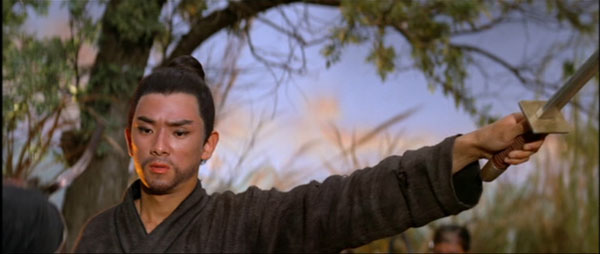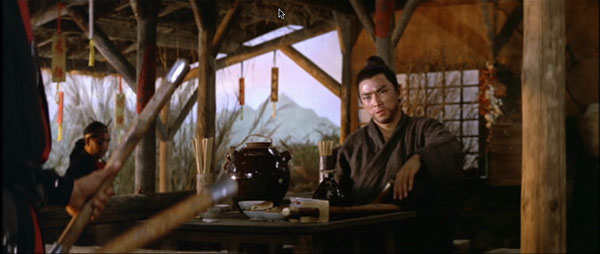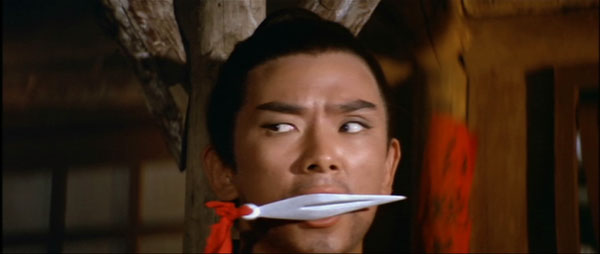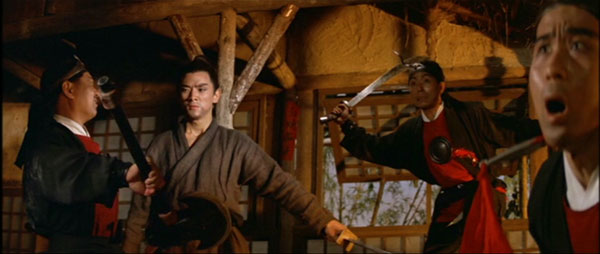| Action
Adventure Reviews
|
The One-Armed Swordsman, 1967. Directed by Chang Cheh.
Jimmy Wang Yu, Chiao Chiao, Feng Tien, Di Tang, Chih-Chin Yahg.
Synopsis: Qi Rufeng takes in Feng Gang, the son of his servant, after the servant sacrifices his own life for that of his master. Rufeng instructs Feng Gang in the martial arts of his house, particularly the mastery of his golden sword. Feng Gang is an astute student, and soon outpaces his fellow students, students from rich houses, and Qi Rufeng's own spoiled daughter, Pei-er. After a petulant spat, Pei-er accidentally cuts off Feng Gang's sword arm. Feng Gang flees the scene, and is taken in by peasant girl, Xiaoman, who gives him sanctuary as he heals. Soon, she falls in love with him, too. She's terrified that the world of martial arts will take Feng Gang from her, but she realizes that he must rebuild his skills if he isn't to be a cripple all his life. She gives him her father's martial arts grimoire, which emphasizes left-handed techniques. Meanwhile, Qi Rufeng's enemies, Smiling Tiger and Long-Armed Devil, are conspiring to annihilate him along with all his disciples, they've invented a new weapon designed to counter the Golden swords and one by one, they murder the disciples as they gather for Qi's 55th birthday celebration. Only Feng Gang, with his father's broken sword and his new one-armed technique can counter the conspiracy... Sometimes a Cigar... : Freudian interpretations of Chang Cheh's first big hit are damned near inevitable. The broken sword, the severed arm, the shattered confidence. While there is no explicit castration imagery in the film, the meanings are unmistakable. Which is interesting, I think, given what this film--and what Chang's career as a director in general--brings to the wu xia film as it mutates into the kung-fu film. Until Chang Cheh came along, the emphasis of the majority of wuxia movies was on female characters. This is a curious after-effect of the dawn of Chinese cinema, when male actors trained by the Peking Opera thought that film was beneath them and when all parts, male and female, were played by women. The classic example of this is King Hu's Come Drink With Me from a few years prior to The One-Armed Swordsman, and it persists even unto Crouching Tiger, Hidden Dragon. Chang's worldview, however, is decidedly masculine and his bloodstained epics would become so masculinized that some critics read a barely concealed homo-erotic element into them. I don't know about all of that, myself; the shift towards masculine stories may just as easily reflect Chang's admitted interest in Western cinema, and in Japanese samurai movies, both of which are noticable influences here. Because of the outsized success of this film--it was a box-office blockbuster in Southeast Asia--Chang's brand of male angst became the template for much of the Shaw Brothers' output over the succeeding two decades. The real question, of course, is: is the success of this film a fluke? Or does it deserve it on merit?. And that's a tricky question. The action sequences in The One-Armed Swordsman are primitive, even for their time (see Come Drink With Me, again, for comparison), which is surprising given the involvement of action choreographer Lau Kar-Leung. Additionally, there is a dismaying sameness to the sword-fights here: the bad guys use the same technique with the same results in almost every fight. You do begin to see Chang's love of gore begining to well to the surface, though this film is tame compared to some of his later films. One could argue that the sloppy nature of the martial arts in this film reflects the fact that the movie is largely anti-martial arts in its themes (again, it might be that this is a rejection of the cinematic status quo, too, though reading too many meta-cinematic impulses into genre filmmaking might be foolhardy). There is one exception to all of this that suggests the film's real artistic accomplishment: the fight at the teahouse.
In this sequence, we see several things happening at once that will transform the martial arts film. First: we see the influence of Japanese cinema. In particular, we see a superb "presentational" shot composition that uses architectural framing and we see a visual presentation of our hero that looks like he stepped whole and breathing out of Yojimbo. In fact, the way this is lit recalls the golden sunrise that accompanies the final duel in Hiroshi Inagaki's Samurai III: Duel At Ganryu Island. Second, we see the influence of the various "New Waves" in Chang's use of hand-held cameras and in his use of dutch tilts in the middle of the action. Third, we see a new presentation of heroic attitude in Wang Yu's calm indifference to the men who he kills in this sequence. Wang Yu performs this sequence with a quiet charisma that informs Bruce Lee's anti-establishment charisma a few years later. In sum, these elements announce that Chang is bringing a specific cinematic sensibility to the martial arts film that breaks with the stylized, theatrical traditions of the genre. Which is to say that the film is probably worthy of its success, even if it isn't particularly great. This is an arguable point, I suppose. An action fan is going to be disappointed by the action, but a film fan will probably groove on the strange set of reality provided by Chang's use of Shaw's extensive soundstages. That "set of reality," by the way, reminds me a great deal of the sets of musicals, to which the martial-arts film seems perversely related. As a final note, all of this is has not always been apparent to anyone who watches the movie. Like most Shaw Brothers movies, the presentation in America has often been plagued by bad dubbing, artless cropping of the frame, and poor print quality. Kudos to the current Dragon Dynasty DVD release, for which the Weinsteins have had the good sense to port over Celestial Pictures' pristine transfer. The Weinsteins often have been the bane of Asian cinema in the US, but they get high marks for this one. The One-Armed Swordsman has never looked this good in America.
7/14/2007
|



